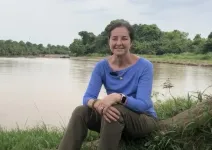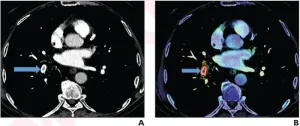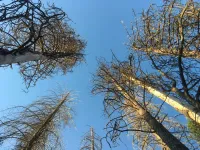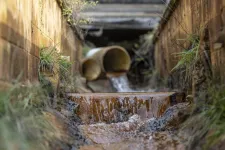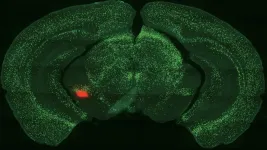(Press-News.org) ITHACA, N.Y. -- Teens’ trust in the news they consume on social media – or lack of it – may be key to whether it supports or detracts from their well-being, according to Cornell-led psychology research.
Surveying nearly 170 adolescents and young adults from the U.S. and U.K. early in the pandemic, the researchers found that those more trusting of the COVID-19 information they saw on Facebook, Twitter and TikTok were more likely to feel it was empowering, while those less trusting were more likely to find it stressful.
The findings highlight the need for news literacy programs to help young people discern fact-based, trustworthy sources from misinformation and conspiracy theories, and support a more nuanced understanding of how social media use impacts well-being and mental health.
“It’s not just the sheer volume of social media use that’s going to have this positive or negative effect,” said Adam Hoffman, assistant professor in the Department of Psychology and College of Human Ecology. “It’s how you engage with social media news that will be more influential in determining how it impacts you.”
Hoffman is the lead author of “The Importance of Trust in the Relation Between COVID-19 Information from Social Media and Well-being Among Adolescents and Young Adults,” published March 23 in PLOS ONE. Nine co-authors are based at North Carolina State University, the University of Virginia, South Carolina-based nonprofit EdVenture, and in the U.K., the University of Exeter and the University of Cambridge.
Prior research on social media’s impact on well-being and mental health is somewhat muddled, the scholars said, finding both good and bad influences. For example, some studies have shown it can foster social connection and self-expression, others that it facilitates bullying and feelings of inferiority.
As the pandemic took hold in early 2020, daily exposure to negative headlines on social media helped popularize the terms “doomscrolling” and, among those trying to escape stressful media, “news avoidance.” The virus that causes COVID-19 also became the subject of rampant misinformation, labeled an “infodemic” by the World Health Organization.
In that environment, the research team asked 168 students enrolled in a science, technology, engineering and math after-school program about their engagement with COVID-19 news on Facebook, Twitter and TikTok – the most popular platforms for sharing news, each also criticized for spreading misinformation. The ethnically and racially diverse participants, who ranged from 14 to 23 years old and averaged age 17, were asked how often they were exposed to COVID-19 information, how much they trusted it and about their well-being, measured in three ways: emotional, psychological and social.
Unexpectedly, encountering COVID-19 news an average of a few times a week either had no effect on well-being or was seen as slightly positive. The researchers speculated that exposure to pandemic news might have made teens feel more informed about the virus and world events, even if it was difficult or depressing.
Trust in the news, however, emerged as a “driving factor” in the relationship: Higher levels of trust were linked to a more positive sense of social well-being – feeling informed and connected, part of a community – and lower levels in some cases the opposite.
Though trust may be good for well-being, “blind” trust in social media news also has a potential downside, with one study finding it increased acceptance of COVID-19 myths and conspiracies. That’s why the researchers encourage schools and universities to actively train students in the critical thinking and analytical skills needed to identify accurate information, especially on social media.
“It’s not just that we need to trust, but that we need to trust credible sources of news that are factually based and have been vetted,” Hoffman said. “That’s how youth can be informed and have a positive sense of well-being and sense of self, and that’s the best of both worlds.”
In addition to Hoffman, co-authors of the research are Angelina Joy, Adam Hartstone-Rose and Kelly Lynn Mulvey of North Carolina State University; Channing J. Mathews of the University of Virginia; Marc Drews of EdVenture; and in the U.K., Luke McGuire, Fidelia Law and Adam Rutland of the University of Exeter, and Mark Winterbottom of the University of Cambridge.
The research was supported by the U.S. National Science Foundation and in the U.K., the Wellcome Trust and Economic and Social Research Council.
-30-
END
Teens who trust online information find it less stressful
2023-04-05
ELSE PRESS RELEASES FROM THIS DATE:
WCS names new President and CEO - Monica P. Medina
2023-04-05
The Wildlife Conservation Society (WCS) announced today that Monica P. Medina, the first diplomat in the U.S. designated to advocate for global biodiversity, has been named WCS President and CEO, effective June 1, 2023. Medina, current Assistant Secretary of State for Oceans, Environment, and Science; and Special Envoy for Biodiversity and Water Resources will serve until April 30, 2023, at the U.S. Department of State.
Medina ushered in a new era of environmental diplomacy as a foreign policy priority at the State Department. She will join WCS to lead its mission to save wildlife and wild places, harnessing the power of its four zoos, an aquarium, and its Global ...
IU researchers receive $8.6M NIH grant renewal to study alcohol use, binge drinking
2023-04-05
INDIANAPOLIS--A multi-disciplinary team of Indiana University researchers is focusing their efforts on a growing public health concern: binge and “high-intensity” drinking—extreme drinking behaviors that are increasingly prevalent among college-age adults.
The researchers, who are part of the Indiana Alcohol Research Center, recently received a five-year, $8.65 million grant renewal from the National Institute on Alcohol Abuse and Alcoholism to support this work.
Established in 1987, the Indiana Alcohol Research Center (IARC) is housed at IU School of Medicine and led by director David Kareken, PhD, a professor of ...
Looking beyond the horizon
2023-04-05
Texas Tech’s Thomas Maccarone has received a grant from the U.S. Air Force Office of Scientific Research to study possible impacts of one layer of the earth’s ionosphere upon radio communications.
Maccarone, a professor in the Department of Physics and Astronomy, said the project will have short- and long-term benefits and implications. The one-year grant is for just more than $500,000.
“We will use a set of dipole radio antennas to study what is called the sporadic E-layer of the ionosphere,” he said. “That is the short-term component the Air Force ...
AI cuts CT turnaround, wait times for positive pulmonary embolus
2023-04-05
Leesburg, VA, April 5, 2023—According to an accepted manuscript published in ARRS’ own American Journal of Roentgenology (AJR), a worklist reprioritization tool with artificial intelligence reduced both report turnaround time and wait time for pulmonary embolus-positive CT pulmonary angiography examinations.
“By assisting radiologists in providing rapid diagnoses, the artificial intelligence (AI) tool could potentially enable earlier interventions for acute pulmonary embolus (PE),” concluded lead researcher Kiran Batra, MD, from the department of radiology at University of Texas Southwestern Medical ...
Gone for good? California’s beetle-killed, carbon-storing pine forests may not come back
2023-04-05
LOS ALAMOS, N.M., April 4, 2023—Ponderosa pine forests in the Sierra Nevada that were wiped out by western pine beetles during the 2012-2015 megadrought won’t recover to pre-drought densities, reducing an important storehouse for atmospheric carbon.
“Forests store huge amounts of atmospheric carbon, so when western pine beetle infestations kill off millions of trees, that carbon dioxide goes back into the atmosphere,“ said Zachary Robbins, a postdoctoral at Los Alamos National Laboratory.
Robbins is corresponding author of a new paper published in the journal Frontiers in Environmental Science about carbon stored in living ponderosa pines in the ...
Dual quasars blaze bright at the center of merging galaxies
2023-04-05
Galaxies grow and evolve by merging with other galaxies, blending their billions of stars, triggering bursts of vigorous star formation, and often fueling their central supermassive black holes to produce luminous quasars that outshine the entire galaxy. Some of these mergers eventually go on to become massive elliptical galaxies that contain black holes that are many billions of times the mass of our Sun. Although astronomers have observed a veritable menagerie of merging galaxies with more than one quasar in our own cosmic neighborhood, more distant examples, seen when the Universe was only a quarter of its current age, are quite rare and ...
SFU research aids fight against treatment-resistant superbugs
2023-04-05
Researchers at Simon Fraser University are studying the genes of superbugs to aid the development of new and effective treatments for drug-resistant bacterial infections. Superbugs are characterized as infection-causing bacteria resistant to treatment with antibiotics.
“Antimicrobial resistance occurs when the disease-causing bacteria has ways to overcome the antibiotics that we use in treatment for infections,” says assistant professor Amy Lee, of SFU's Department of Molecular Biology and Biochemistry. The initiative is a collaboration between the Lee Lab and Brinkman Lab, which are working together as ...
Underground water could be the solution to green heating and cooling
2023-04-05
About 12% of the total global energy demand comes from heating and cooling homes and businesses. A new study suggests that using underground water to maintain comfortable temperatures could reduce consumption of natural gas and electricity in this sector by 40% in the U.S. The approach, called aquifer thermal energy storage (ATES), could also help prevent blackouts caused by high power demand during extreme weather events.
“We need storage to absorb the fluctuating energy from solar and wind, and most people are interested in batteries ...
WVU researchers earn $8M for rare earth extraction facility, an economic and environmental game changer
2023-04-05
West Virginia University researchers will continue to develop and advance their pioneering method to extract and separate rare earth elements and critical minerals from acid mine drainage and coal waste, courtesy of $8 million in new funding from the U.S. Department of Energy.
The grant, part of President Joe Biden’s Investing in America agenda, will lead to the design, construction and operation of a pre-commercial demonstration facility for separating and refining rare earth elements and critical minerals, according to Paul Ziemkiewicz, project lead and director of the West Virginia Water ...
Danger or pleasure? How we learn to tell the difference
2023-04-05
Deep within our brain’s temporal lobes, two almond-shaped cell masses help keep us alive. This tiny region, called the amygdala, assists with a variety of brain activities. It helps us learn and remember. It triggers our fight-or-flight response. It even promotes the release of a feel-good chemical called dopamine. Scientists have learned all this by studying the amygdala over hundreds of years. But we still haven’t reached a full understanding of how these processes work.
Now, Cold Spring Harbor Laboratory neuroscientist Bo Li has brought us several important steps closer. His lab recently made a series of discoveries ...
